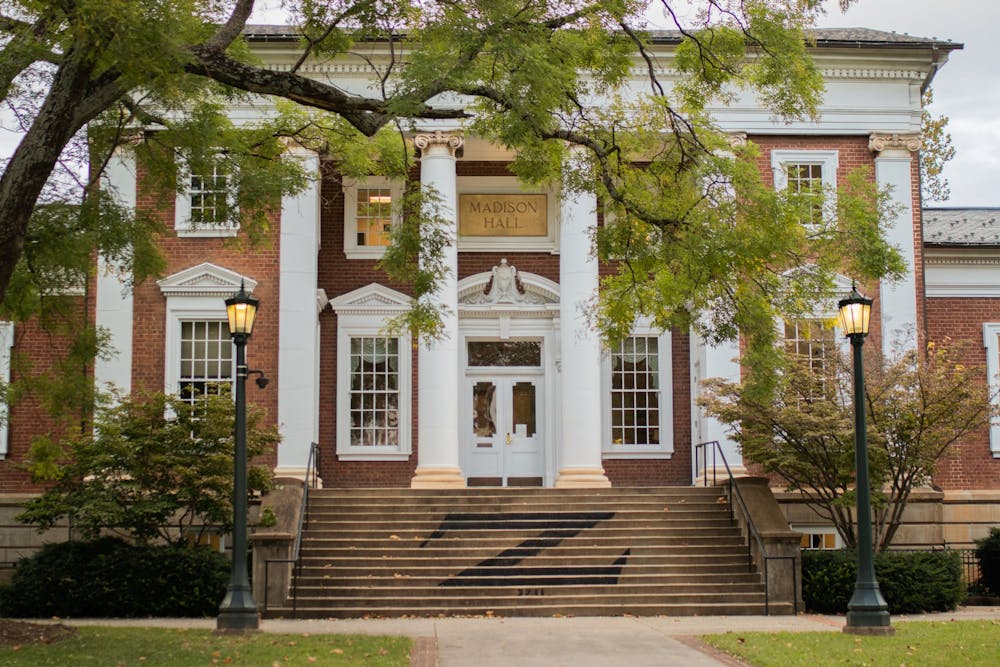Christa Acampora found her love for higher education during 20 years of teaching across multiple states and, after expanding into administrative roles, joined the University in August as the Dean of the College and Graduate school of Arts and Sciences. A native Virginian, Acampora found the mountains calling her back home to professors and faculty at the University — where she hopes to foster a sense of community among students.
Acampora succeeds Provost Ian Baucom, who spent eight years in the role. The dean is responsible for overseeing both the College and Graduate School of Arts and Sciences, along with interacting with alumni, facilitating research development and recruiting faculty.
As a first-generation college student who graduated with a bachelor of arts in philosophy from Hollins University, Acampora later obtained her masters and PhD from Emory University.
Acampora said her time in the classroom proved key to her student-based approach to education.
“I learned more from my students than I could have ever imagined teaching them,” Acampora said.
During Acampora’s undergraduate time at Hollins University, she received a grant to study the papers of Thomas Jefferson’s Virginia Statute for Religious Freedom, which detail the separation of church and state. This experience — along with growing up in Virginia — created a tie between Acampora and the University.
“I already had strong attachment to U.Va. in particular, and then the opportunity to lead the School of Arts and Sciences, the heart and soul of the institution, that was just irresistible,” Acampora said.
During her time at the University, Acampora plans to prioritize student success over administrative processes in a large university. She said that it can be easy to get lost in the idea that the University is just a business and forget that the main point is to educate students.
“Put the student experience at the center,” Acampora said. “[We exist] really to deliver the very best outcomes for our staff, our faculty and our students.”
The lasting power of the University experience on students’ lives, Acampora said, is evident in her conversations with alumni, and sometimes even with whole families that remain connected with the school.
“Finding ways of amplifying [stories and connections] and making that accessible to as many people as possible so that U.Va. continues to have that special place of pride and people's hearts and minds — that's great and important work that lies ahead,” Acampora said.
Prior to arriving at the University, Acampora was a faculty member at Hunter College, City University of New York and Emory. Additionally, she held the title of associate provost for faculty affairs and research at Hunter and most recently she was deputy provost at Emory.
During her time at Emory, Acampora played a vital role in creating a comprehensive faculty data system — which includes information from faculty and staff — and shaping the first Office of Faculty Affairs at Emory. Acampora said she hopes to bring the same attention to faculty at the University.
One prominent issue among faculty members is pay. At this August’s Board of Visitors meetings, Chief Operating Officer J.J. Davis described a “war on talent” in reference to high vacancy rates among faculty and staff. These vacancies are the result of less competitive pay — the University currently sits at the 29th percentile of competitors in terms of faculty salary. Acampora said that in conversations with professors, she has noticed both concerns with pay along with a desire for more connections.
“Ultimately, U.Va. will have to be a place that's harder to leave than it is to stay, and the most talented people want to stay where they're surrounded by other talent and where they feel like they're supported to do their best work,” Acampora said.
Acampora also said the University could improve conditions for professors by supporting a strong graduate student community that can participate in research with faculty.
In addition to faculty retention, Acampora worked to improve the advising process at Emory by helping to create a center that incorporated academic advising and career services. When faced with recent student dissatisfaction with University advising, she said she plans to utilize this previous experience.
A survey conducted last spring by Josipa Roska, associate provost for undergraduate education and asst. sociology professor, found that 60 percent of undeclared students were satisfied with the quality of advising, compared to 80 percent of students who had declared a major. Students are randomly assigned to an advisor as a first year and receive a major advisor in the relevant department after declaring.
In a similar vein, Acampora hopes to improve advising at the University by looking at the whole student experience and removing any bureaucratic roadblocks.
“I'm really keen to take on advising but I hope that we'll have a process that helps us take a more holistic view on what students need and what their aspirations are for how they come to the University,” Acampora said.
Ultimately, Acampora said she is glad to be back in a student-facing role. She said that as dean, the responsibilities allow for much more time interacting with students than in the role of provost.
“One of the big draws for me and taking on a dean's role instead of a provost’s role was getting to spend more time with students and just having been in the classroom for decades I crave those experiences,” Acampora said.







